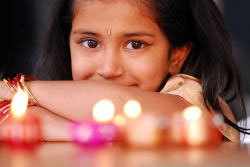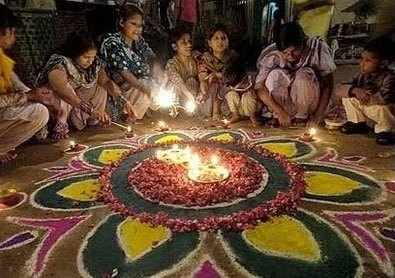Deepawali: Illuminating the Life
Diwali or Deepawali is one of the most popular and awaited festivals of India. The original name of this sacred festival is Deepawali and it has its origin in Sanskrit that means ‘rows of lamps’ (deep). It is popularly known as ‘festivals of lights’.
 For Hindus, Diwali marks return of Lord Ram to Ayodhya after 14 years of exile and killing demon king Ravana. It signifies victory of good over evil and holds a lot of spiritual and religious importance for Hindus. In Jainism, Diwali marks attainment of ‘Moksha’ by ‘Mahavir’ in 527 B.C. In Sikhism, Diwali symbolizes the return of Guru Har Gobindji to Amritsar after liberating 52 Hindu kings imprisoned by Emperor Jahangir from the fort of Gwalior,. Diwali is celebrated with lot of zeal, gusto and enthusiasm. Women start cleaning up their houses months before Diwali. They prepare sweets, rangoli and beautifully decorate their houses to welcome goddess Lakshmi. However, the most significant part of Diwali is lighting up of oil lamps and bursting crackers. Lighting up of lamps signifies victory of good over evil and freedom from inner darkness and bursting crackers is an act of jubilation. Diwali is a five days festival with each day having its own significance and rituals. A brief understanding is as follows: 1. ‘Dhanteras’ marks the begining of this five days festival. ‘ Dhan’ means wealth and ‘teras’ stands for the thirteenth day of the month. This day is considered auspicious for buying utensils, gold and silver. 2. The second day is known as ‘Choti diwali’ or ‘Roop Choudas’. Hindus wake up before dawn, take scented oil bath and dress up in new clothes. The tradition of playing cards is also observed in some families. 3. The third day is ‘Badi Diwali’ or ‘Lakshmi Pujan’. This is the most important day. Hindus worship Goddess Lakshmi – the goddess of wealth and Lord Ganesh, the god of auspicious beginning and then light lamps and burst crackers. 4. ‘Goverdhan Puja’ marks the fourth day, also called ‘Annakut’. Cattle and calf are worshiped. For ‘Annakut’ large quantity of food is decorated in the form of Goverdan hill lifted by lord Krishna to save the people and cattle from floods and rain. 5. The fifth day is known as ‘Bhaiduj’ or ‘Bhaiyyaduj’. On this, day brothers and sisters meet to express their love and affection.
For Hindus, Diwali marks return of Lord Ram to Ayodhya after 14 years of exile and killing demon king Ravana. It signifies victory of good over evil and holds a lot of spiritual and religious importance for Hindus. In Jainism, Diwali marks attainment of ‘Moksha’ by ‘Mahavir’ in 527 B.C. In Sikhism, Diwali symbolizes the return of Guru Har Gobindji to Amritsar after liberating 52 Hindu kings imprisoned by Emperor Jahangir from the fort of Gwalior,. Diwali is celebrated with lot of zeal, gusto and enthusiasm. Women start cleaning up their houses months before Diwali. They prepare sweets, rangoli and beautifully decorate their houses to welcome goddess Lakshmi. However, the most significant part of Diwali is lighting up of oil lamps and bursting crackers. Lighting up of lamps signifies victory of good over evil and freedom from inner darkness and bursting crackers is an act of jubilation. Diwali is a five days festival with each day having its own significance and rituals. A brief understanding is as follows: 1. ‘Dhanteras’ marks the begining of this five days festival. ‘ Dhan’ means wealth and ‘teras’ stands for the thirteenth day of the month. This day is considered auspicious for buying utensils, gold and silver. 2. The second day is known as ‘Choti diwali’ or ‘Roop Choudas’. Hindus wake up before dawn, take scented oil bath and dress up in new clothes. The tradition of playing cards is also observed in some families. 3. The third day is ‘Badi Diwali’ or ‘Lakshmi Pujan’. This is the most important day. Hindus worship Goddess Lakshmi – the goddess of wealth and Lord Ganesh, the god of auspicious beginning and then light lamps and burst crackers. 4. ‘Goverdhan Puja’ marks the fourth day, also called ‘Annakut’. Cattle and calf are worshiped. For ‘Annakut’ large quantity of food is decorated in the form of Goverdan hill lifted by lord Krishna to save the people and cattle from floods and rain. 5. The fifth day is known as ‘Bhaiduj’ or ‘Bhaiyyaduj’. On this, day brothers and sisters meet to express their love and affection.  Diwali marks for huge and grand celebration in Udaipur. The festivity grabs Udaipurites. The streets of Bapu Bazaar and Ashwini Bazaar, illuminated with beautiful lights and lamps look really gorgeous and attractive. People visit markets just to witness the beauty and splendor of the city. Every year Diwali Dusshera Mela is also organized at Town Hall. This is a major attraction for Udaipurites as it offers a variety of shops and stalls relating to household and ornamental things. Evenings are dedicated to cultural programmes and events. The City of Lakes, thus, has its won special way of celebrating this auspicious occasion. We wish all all dedicated readers, community members, fans and friends a blessed Diwali!! Happy Diwali!
Diwali marks for huge and grand celebration in Udaipur. The festivity grabs Udaipurites. The streets of Bapu Bazaar and Ashwini Bazaar, illuminated with beautiful lights and lamps look really gorgeous and attractive. People visit markets just to witness the beauty and splendor of the city. Every year Diwali Dusshera Mela is also organized at Town Hall. This is a major attraction for Udaipurites as it offers a variety of shops and stalls relating to household and ornamental things. Evenings are dedicated to cultural programmes and events. The City of Lakes, thus, has its won special way of celebrating this auspicious occasion. We wish all all dedicated readers, community members, fans and friends a blessed Diwali!! Happy Diwali!To join us on Facebook Click Here and Subscribe to UdaipurTimes Broadcast channels on GoogleNews | Telegram | Signal


